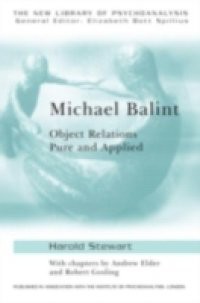Whilst Michael Balint's applied work is widely known, many of his theoretical contributions have been incorporated into everyday analysis without due recognition of their source. In this account of his thinking, Harold Stewart evaluates the extent of Balint's contribution to psychoanalysis and firmly re-establishes his place within the development of Object Relations theory. The first section examines Balint's theories of human psychological development, defining such concepts as primary love, ocnophilia and philobatia, the basic fault and the three areas of the mind. The author places Balint's understanding of the analyst's influence and technique in the context of his relationship with Sandor Ferenczi, his analyst and mentor. The second section of this work looks at how the "Balint Group" has contributed to the assessment and understanding of emotional problems in various areas, including general practice, marital work and psychosexual medicine. A charismatic teacher, Balint's method of work with General Practitioners has become an established worldwide institution. Features of this work, including the use of countertransference and the affective response of the doctor are vividly described here by two General Practitioners, Andrew Elder and Robert Gosling. Michael Balint: Object Relations, Pure and Applied brings alive Balint's teaching and practice and demonstrates the relevance of his theories to many of the problematic issues in current analytic practice.

